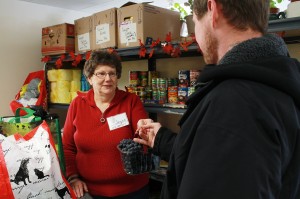 [1]
[1]Joyce Welsh, a volunteer with Gleaners Food Bank, hands out fresh grapes from the Niagara region. Photo by Tyson Leonard.
By Tyson Leonard
BELLEVILLE – When people think of the local-food movement, images of farmers’ markets, artisan cheese and heirloom organic produce often come to mind.
But Louise Livingstone of Harvest Hastings [2], a group that supports and promotes agriculture in Hastings County, says the movement is about more than what’s on the menus of fancy restaurants.
“There is a spot of disconnect between lovely local food in restaurants and the fact that we’ve got famers here that can produce food but we’ve got a lot of people here that aren’t getting enough,” Livingstone said.
The Local Food Act [3] recently passed by the Ontario government is an attempt to address that issue. The legislation gives farmers a tax credit of 25 per of the fair market value of any food they donate to community food programs.
Livingstone said the tax credit might help, but it’s not enough.
“I think all too often farmers are expected to donate. Now that there’s the new legislation and they can get a tax relief on donations, that changes things a bit – but a lot of the farmers in this area, especially the small farmers, are struggling to make a living,” she said.
“If people can’t earn enough to buy food for themselves, and farmers can’t earn enough to survive, tax credits are not going to make much difference.”
The government needs to look at the issue within a larger context, she said.
“Its not just tax receipts for farmers for food banks … you have to look at food banks in the whole context of food security.”
Livingstone suggested that the government focus more on improving programs such as Ontario Works and the Ontario Disability Support Program so that people don’t need food banks in the first place.
Suzanne Quinlan, the executive director of Gleaners Food Bank [4] on Wallbridge Crescent in Belleville, says she is hopeful that the new legislation will help stock the Gleaners shelves with local produce.
Until now, farmers have received nothing in return for donating their products to food banks, she noted. “Anything we receive from the farmers, they get no credit at all. And we still receive some, but this might be an incentive for some, as this is a farming area.”
Quinlan said that since she took over as Gleaners’ executive director in 2002 she has been on a campaign to increase the amount of local produce on its shelves. At the outset she noticed a lack of food quality that could be fixed by buying local, she said.
“I looked at what we were providing clients, and it was like chicken dogs. And I was thinking, ‘You know, it’s a factory from Bramalea and it’s not a good product.’ Local people, including the farmers, donate to Gleaners, so why would we spend our money buying something from Bramalea? We should spend our money locally.”
She has strengthened the food bank’s partnership with Harvest Hastings and has started an organic garden at Gleaners.
“We try to have some form of fresh produce. Right now we have tomatoes and grapes, and we ran out of potatoes so I’ll be going down to the market to buy 10 50-pound bags,” she said.
Gleaners has months’ worth of food on hand thanks to its last food drive in October, but the food bank is continually in need of fresh, healthy local produce, Quinlan said.